- 76% of respondents plan to spend more time on online reputation management in the next 12 months
- The average local marketer spends 17% of their time on online reputation management
- A positive online reputation helps customers trust businesses, converts searchers into leads, and boosts local search rankings
- The most difficult reputation management task is identifying and removing fake reviews – with 58% of businesses having received negative or positive fake reviews
- Businesses are being held back from managing their reputation because of time and budget constraints
- 44% of respondents currently use online reputation management software to monitor, generate or respond to reviews
With reviews becoming ever more commonplace for local businesses, we wanted to uncover the ways that those in charge of marketing for local businesses saw, used and prioritized online reputation management solutions.
We asked the attendees of the Local Business Marketing Summit a series of questions on online review management in 2018. Thank you to the Local Marketing Institute for giving us this opportunity, as well as to the 255 marketers, SMBs, and enterprise employees who spared their time to share their insights.
If you had any questions on the survey’s demographics or contents, please get in touch on [email protected], or leave us a comment below.
Questions
- How important is a positive reputation to the success of your / your clients’ businesses?
- How much of your working week is devoted to online reputation management?
- What are the most important benefits of a positive reputation?
- How difficult are online reputation management tasks?
- What’s stopping you from putting more effort into online reputation management?
- In the next 12 months, will you spend more time on online reputation management?
- In the next 12 months, how much of a priority will online reputation management be for your business?
- What are the most important review sites?
- Have you had fake reviews written about your / your clients’ businesses?
- Do you currently use software to help manage your online reputation?
- Why do you use online reputation management software?
- What’s stopping you from using online reputation management software?
- What are the best practices to follow for successful online reputation management?
How important is a positive reputation to the success of your / your clients’ businesses?
Key Findings
- 87% of respondents say a positive reputation is very important to their business success
- A positive reputation is important to every respondent
A positive reputation is a huge boon for every business, so it’s great to see that its necessity is so universally recognized.
It’s always been really important for businesses to develop a positive perception that attracts customers. And in recent years, online reviews have become more and more prevalent, with 82% reading reviews in 2019 (up from 67% in 2010).
With consumers placing so much emphasis on reviews when choosing a local business, we’re really pleased that reputation is so important to the local businesses, enterprises, and marketers of our study.
How much of your working week is devoted to online reputation management?

The above averages are based calculating midpoints for a set percentage range.
Key Findings
- 69% of respondents spend 1-20% of their working weeks on online reputation management
- The average proportion of the week is 17%, with enterprise businesses spending the most time
While the majority of people chose the smallest segment, the estimated average equates to 17% of all respondents’ working weeks. This is almost a day a week!
Of course, online reputation management is a vital tool for business success, but that doesn’t mean it should dominate your time. There are a number of tools out there to help automate the monitoring, responding to, and asking customers for more reviews. By automating such processes, you can achieve the same results, but free yourself up to focus on the improvements necessary to build a business worthy of positive reviews.
What are the most important benefits of a positive reputation?

Respondents were able to choose three options.
Benefits of a Positive Reputation
- Makes potential customers trust businesses more
- Helps to convert searchers into new business leads
- Boosts rankings in local search results
- Makes businesses stand out from competitors
- Generates more clicks and calls from new customers
The two biggest advantages to businesses are improving trust among customers, and helping to convert leads. As explored in our Local Consumer Review Survey, 91% of consumers said positive reviews made them more likely to use a local business.
Benefits related to trust were more important than those directly linked to financial gain. While a positive reputation often links directly to increased custom, it’s refreshing that trust is respondents’ top priority. After all, developing a trustworthy business will attract customers in itself in today’s online reviews-focused world.
Boosting search rankings was also a key priority for many of our respondents. According to Moz’s 2018 Local Search Ranking Factors survey, review signals make up a significant proportion of local ranking position, so it’s no wonder this is such a high priority.
How difficult are online reputation management tasks?

The Most Difficult ORM Tasks
Identifying and removing fake reviews
Our research finds that 79% of consumers read a fake review in the past year, with 25% saying they’d read “a lot”. It can be difficult to spot a fake review, but often, even harder to get these removed. If you’re in need of advice, Ben Fisher wrote a great blog on how to tackle a fake review attack.
Encouraging customers to write online reviews
Getting customers to leave reviews can sometimes feel like an uphill struggle. But, according to our data, 67% of consumers who are asked to leave a review go on to do so. There are plenty of tactics and touchpoints to consider when generating reviews – from asking during sales, to follow up emails, to including reminders on receipts, and beyond. Find out how we can help you connect with your customers to get more reviews.
Educating staff about the importance of reviews
While it’s easy for business owners and marketers to appreciate the benefits of a positive online reputation, it can be harder to filter this importance down to the rest of the team. Share feedback freely among the team, praising staff for their good work, and making visible changes based on negative customer reviews. If appropriate, you could consider linking your online reputation to staff’s performance reviews and bonuses. The better the business does, the better they do.
Finding the most relevant review sites to focus on
It’s important to monitor all of the review sites that your customers may post on or look for a provider on. Monitor the top general review sites (e.g. Google My Business, Facebook, Yelp, Yellow Pages, BBB, Manta, Angi, etc), as well as industry-specific review sites.
Getting an overview of all reviews across sites
Monitoring your online presence takes time and attention to detail. If your strategy relies on irregularly monitoring a handful of top sites, you risk missing negative feedback that could influence potential customers. Online reputation management tools can lift the burden of monitoring a wide range of sites, allowing you to view all your feedback in one place.
What’s stopping you from putting more effort into online reputation management?

Key Findings
- Time is stopping 50% of respondents from putting more effort into online reputation management
- Budget is the second biggest reason
With half of respondents being deterred from expending effort on their online reputation due to time constraints, a significant proportion of businesses are failing to live up to the expectations of local shoppers when it comes to reviews.
The average consumer reads 10 reviews before trusting a business, while only 53% would consider using a business with less than 4 stars – could businesses that don’t meet these expectations risk putting off customers?
Another block for businesses is the availability of budget for online reputation management. Rather than outsourcing or hiring an employee to spend a day a week on your online reputation, it’s worth looking into the affordable tools available to help limit the amount of time spent. Tools shouldn’t have to break the bank.
Just a handful of respondents said they were held back because they didn’t believe consumers trusted online reviews.
In the next 12 months, how much of a priority will online reputation management be for your business?

Key Findings
- 77% of businesses are making online reputation management a priority in the next year
- Just 2% see it as a very low priority
Despite every respondent saying a positive reputation was important to their business success, only 77% plan to make online reputation management a significant priority in the next year.
However, with such a tiny proportion saying it will be a very low priority, it’s likely that the rush towards online reviews will only continue to grow in the future.
In the next 12 months, will you spend more time on online reputation management?
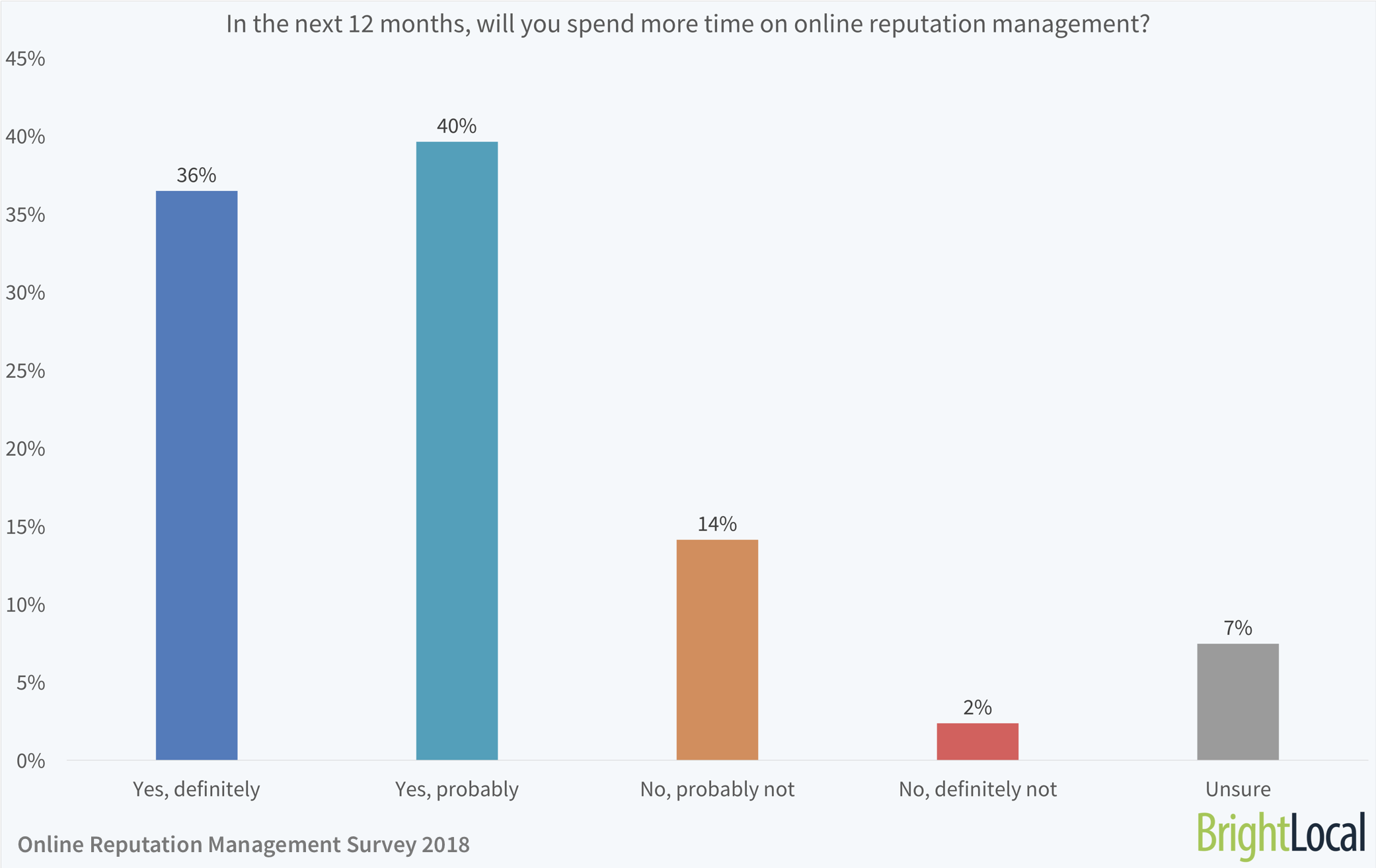
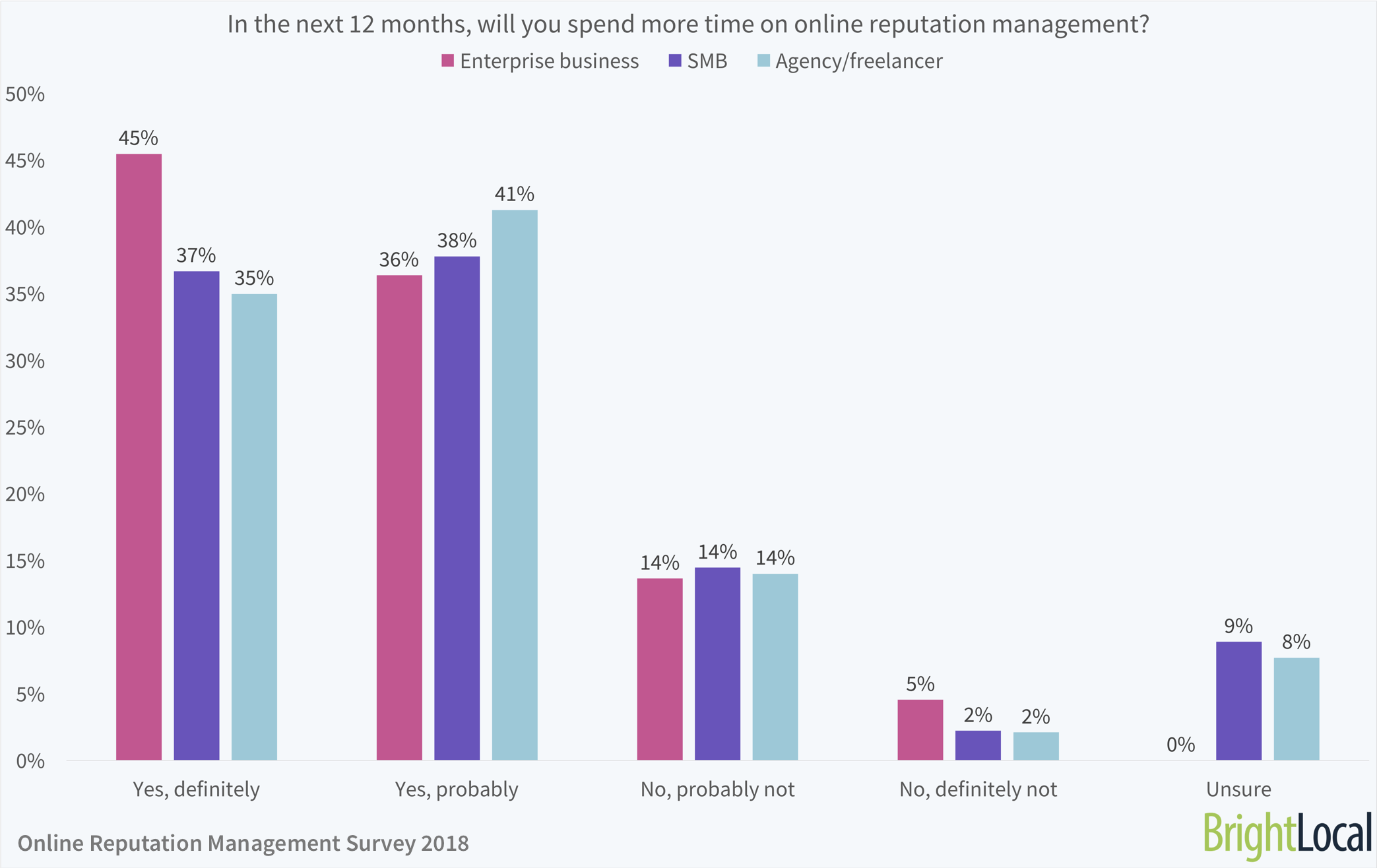
Key Findings
- 76% of respondents plan to spend more time on online reputation management in the next 12 months
- Just 2% ‘definitely’ won’t increase the time they spend on ORM
The majority of respondents are planning to increase the time they spend on managing their reputation over the next year.
With many businesses already spending a significant proportion of their time on their online footprint, it’s interesting to see that so many are expecting to up their time spent. We believe online reputation management should be based on working smarter, not harder. That is, having a set strategy in place for monitoring, generating, and responding to reviews, and saving time reacting on an ad hoc basis.
What are the most important review sites?
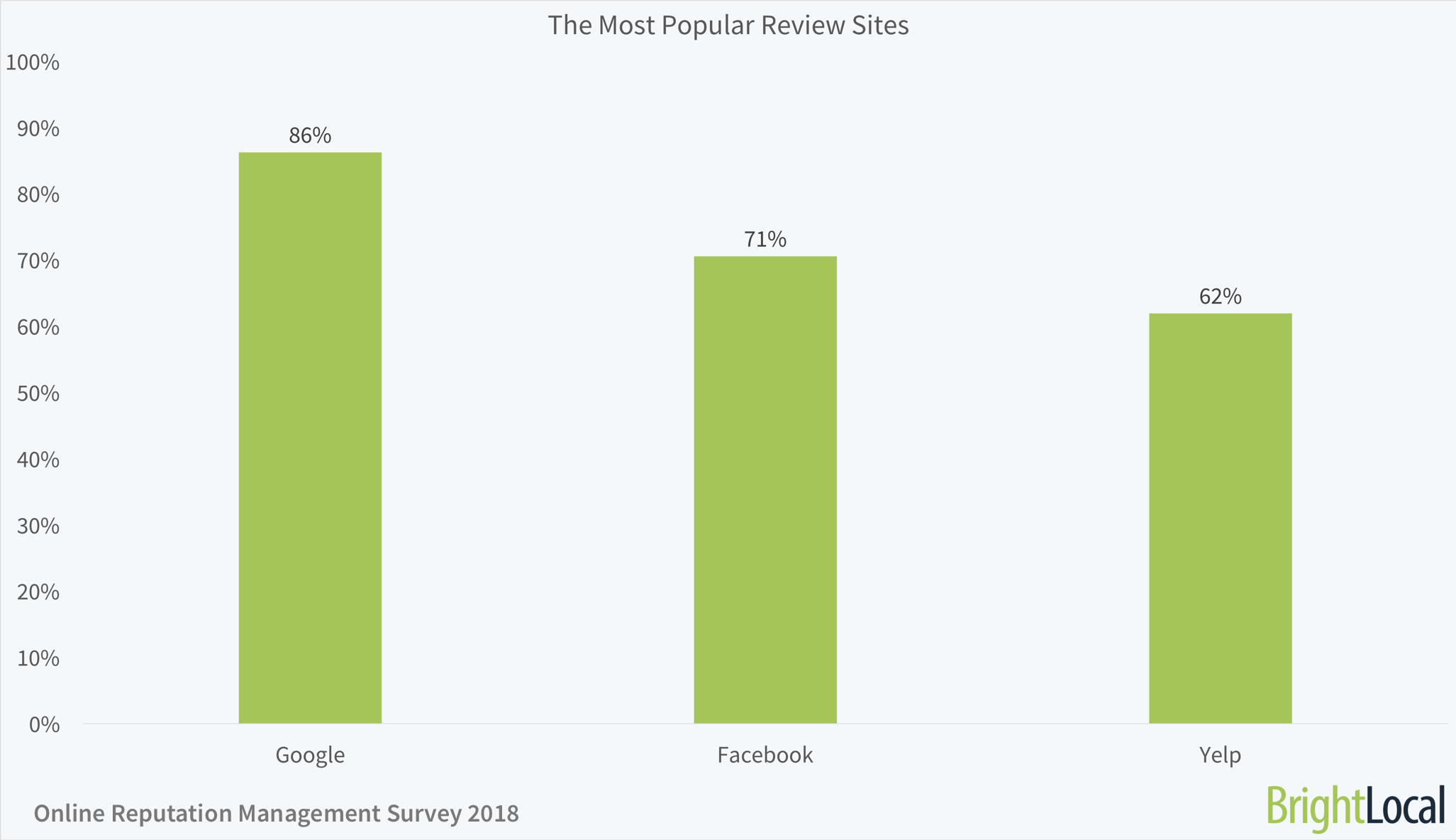
Most In-Demand Review Sites
- Yelp
- TripAdvisor
- Yellow Pages
We asked respondents to share the three review sites that were most important to their business, or the businesses of their clients. While Google, Facebook and Yelp came out significantly on top, there were a further 40 review sites named – showing the breadth of the online review sites network.
It’s not enough to just focus on the big three. It’s all about understanding where your business is, where your competitors are, and where your customers may be looking for inspiration.
Have you had fake reviews written about your / your clients’ businesses?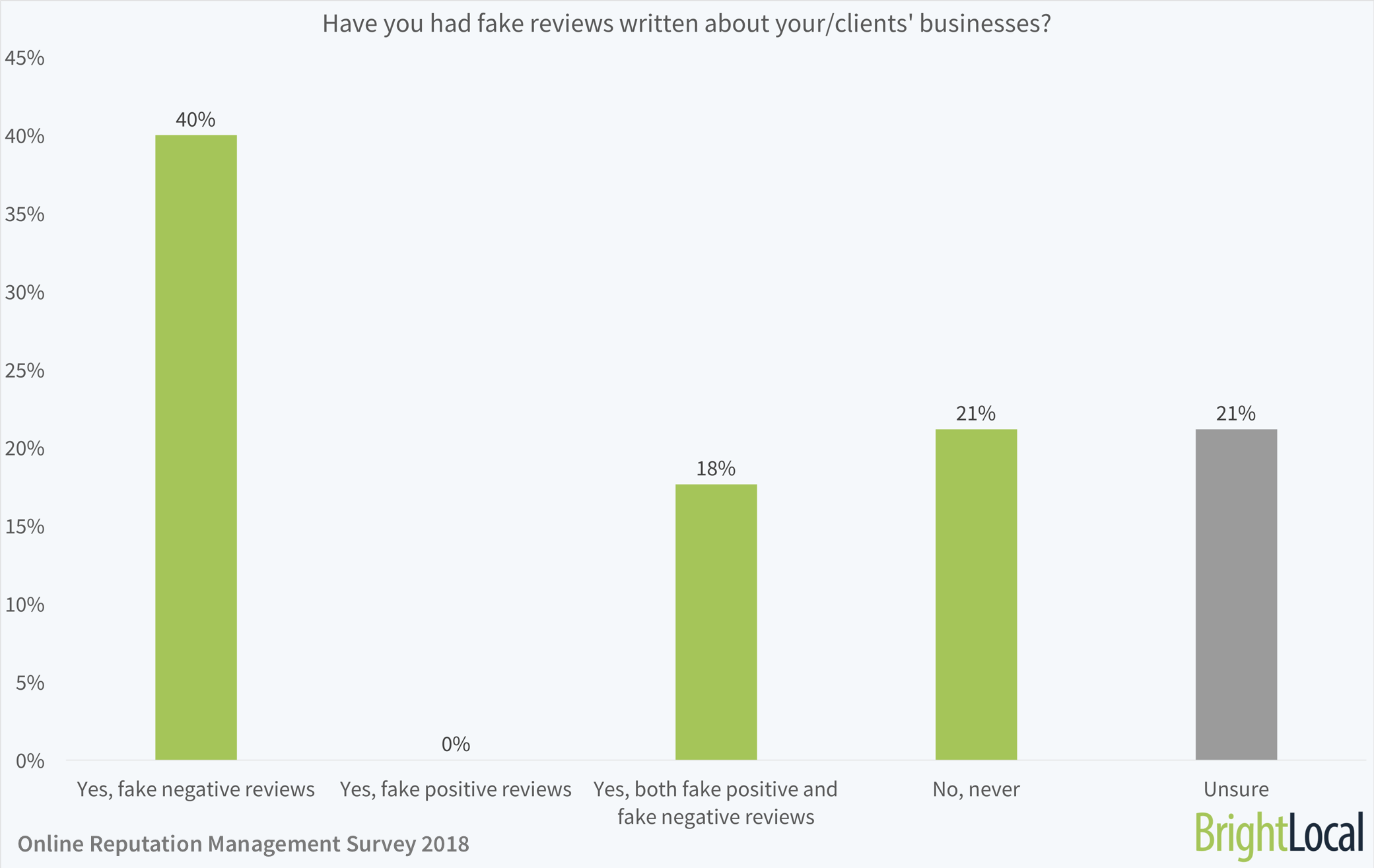
Key Findings
- 58% of businesses have received fake reviews, with a further 21% saying they were uncertain
- It’s far more likely for businesses to get fake negative reviews than fake positive
With such a significant proportion of respondents reporting fake reviews, it’s no wonder these are being noticed by consumers in such high numbers.
Some businesses have had both, but no one has had just fake positive reviews (or, at least, admitted to it!) Though, with Jason Brown reporting a rise in 4-star fake reviews aiming to break a business’s flawless record, this could change in the future.
Despite these high numbers of fake reviews, there still isn’t enough being done by the major review providers to help businesses to take action. Checking reviews on a regular basis helps businesses identify fake or unfair reviews quickly – allowing them to report these to review sites, and respond with your justifications as quickly as possible in case these don’t get taken down.
Do you currently use software to help manage your online reputation?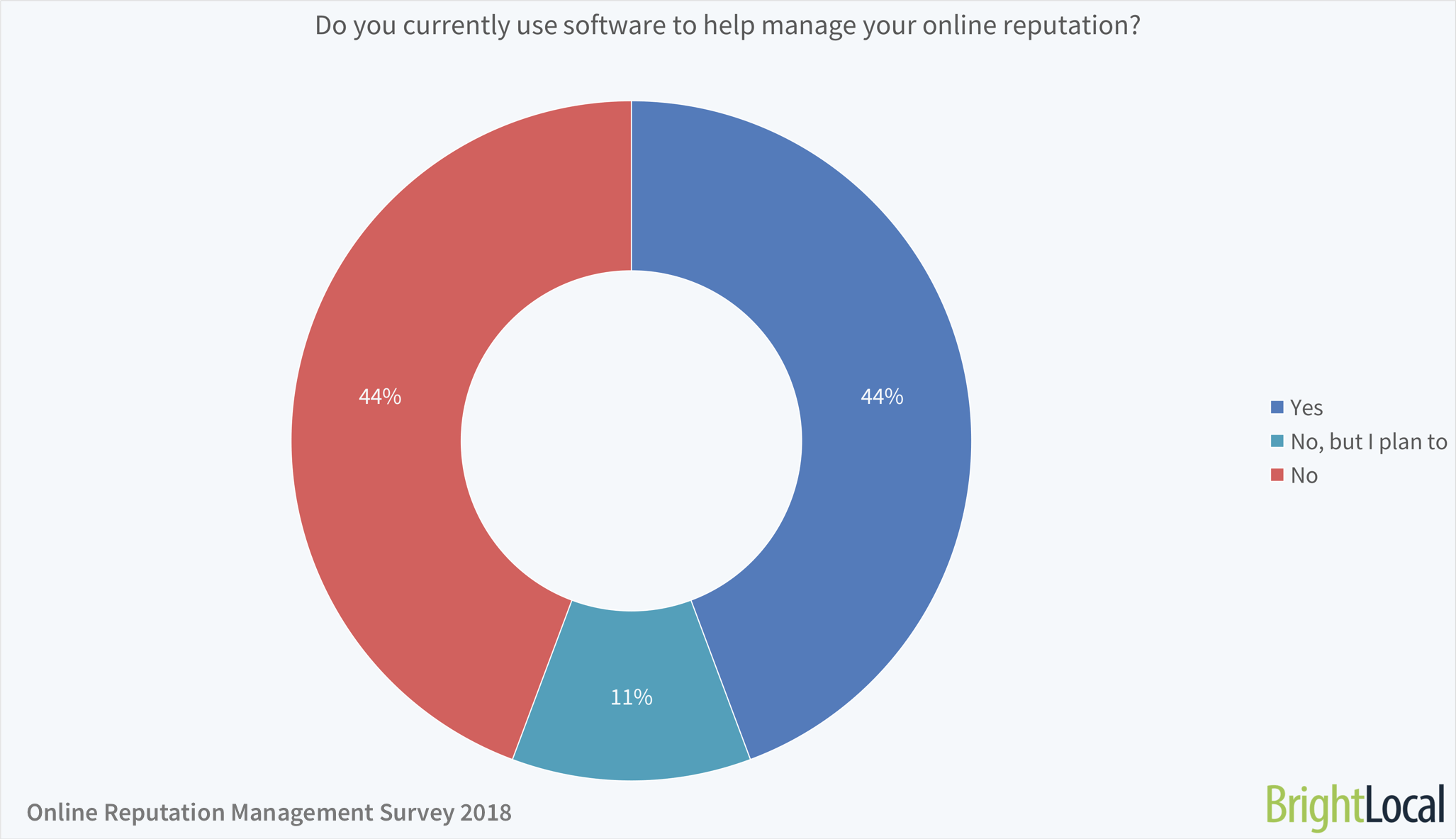
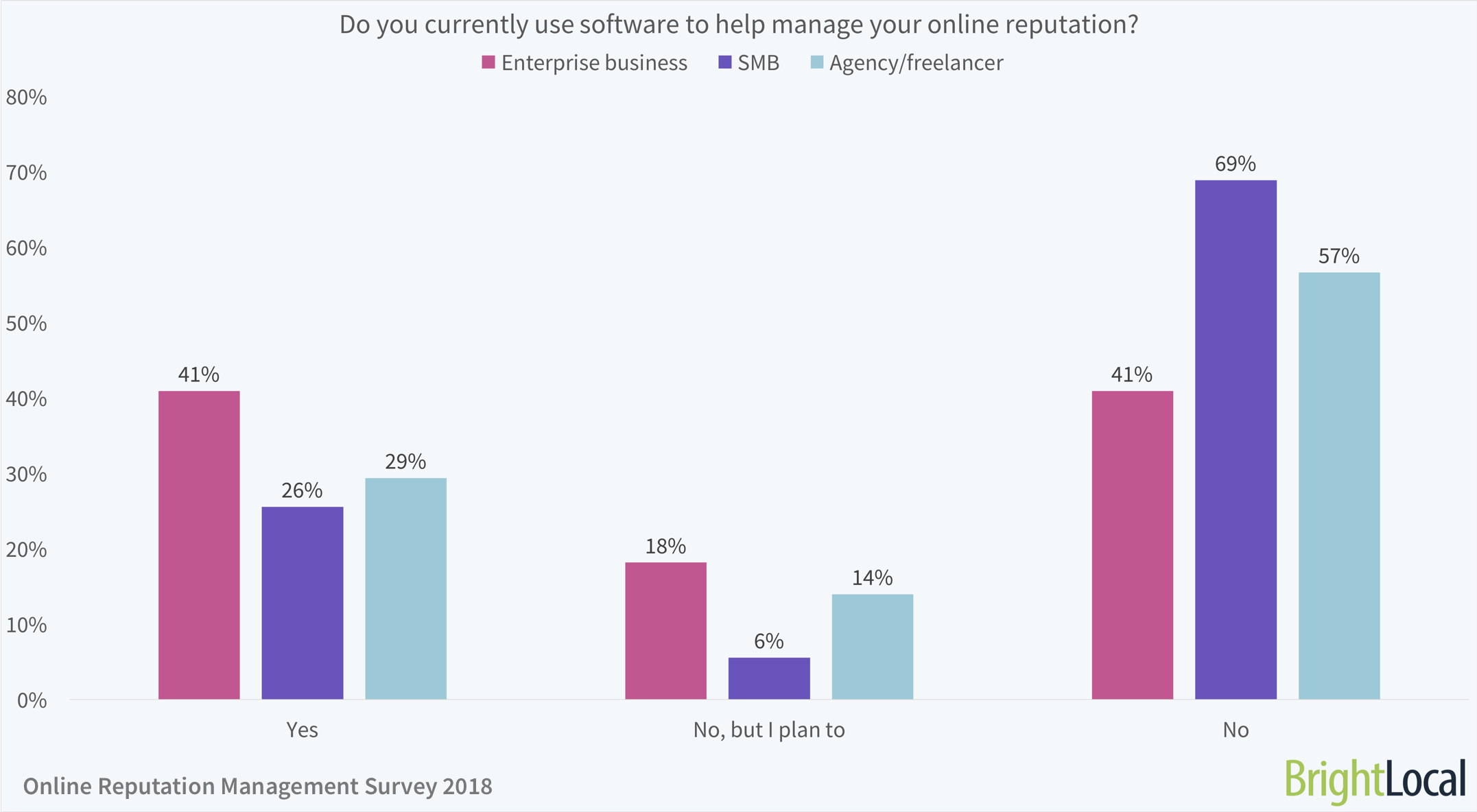
Key Findings
- 44% of respondents currently use online reputation management software
- A further 11% are planning to use ORM
- SMBs are the least likely to be using ORM software
Online reputation management software is growing in popularity, with more than half of respondents set to be using it in the near future.
SMBs have the lowest take-up of such software, with 26% currently using it, and a further 6% planning to. This could be a good sign for agencies, suggesting that some SMBs may need assistance with their reputation management strategy.
Why do you use online reputation management software?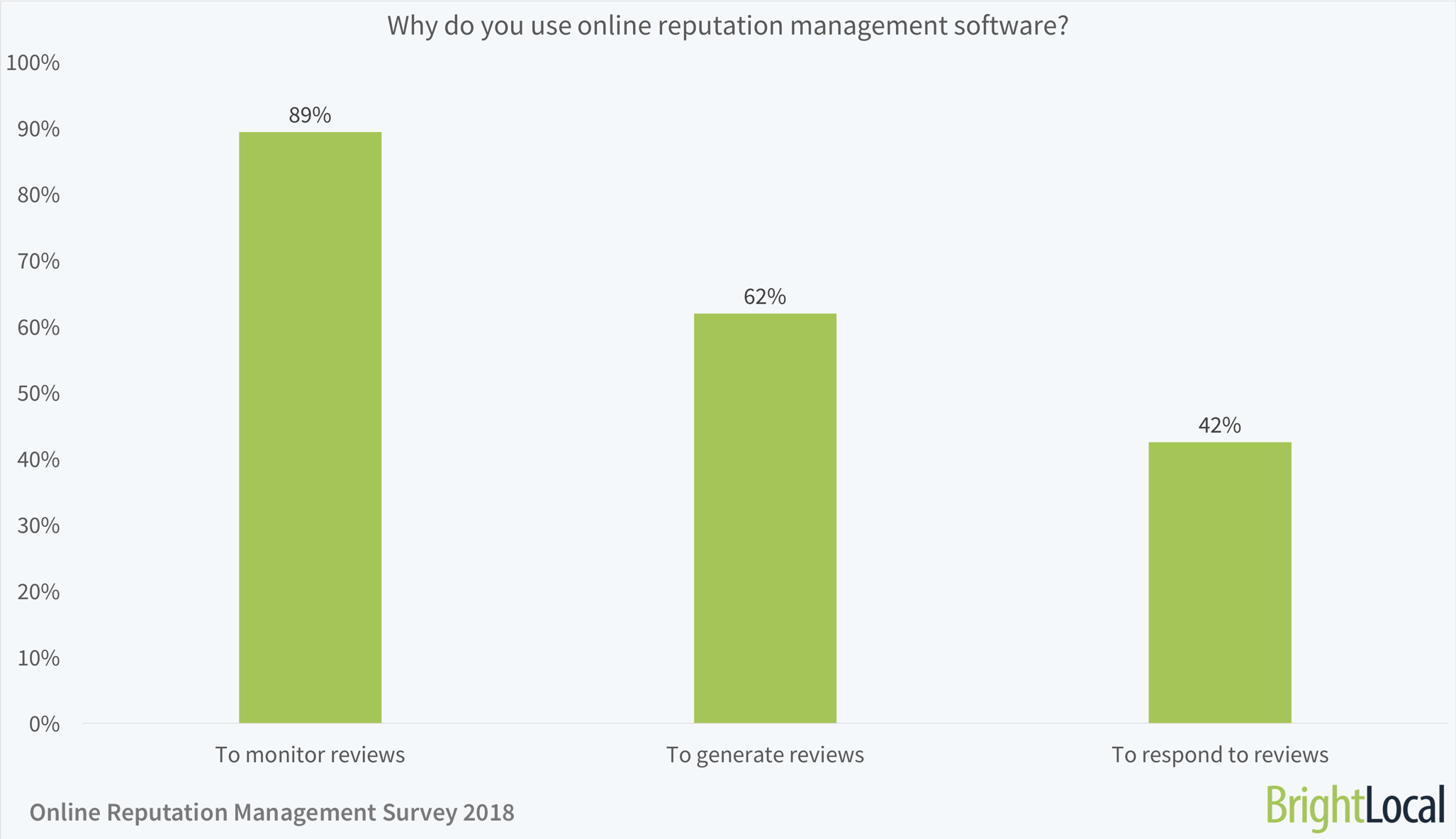
This question was only answered by the 44% of respondents currently using online reputation management software.
Respondents are most likely to be using ORM software to monitor reviews.
A lesser proportion uses ORM to generate new reviews, though, as we discussed above, this is the second hardest reputation-related task. Why are fewer businesses generating reviews using online reputation software? Let us know your thoughts in the comments below.
What’s stopping you from using online reputation management software?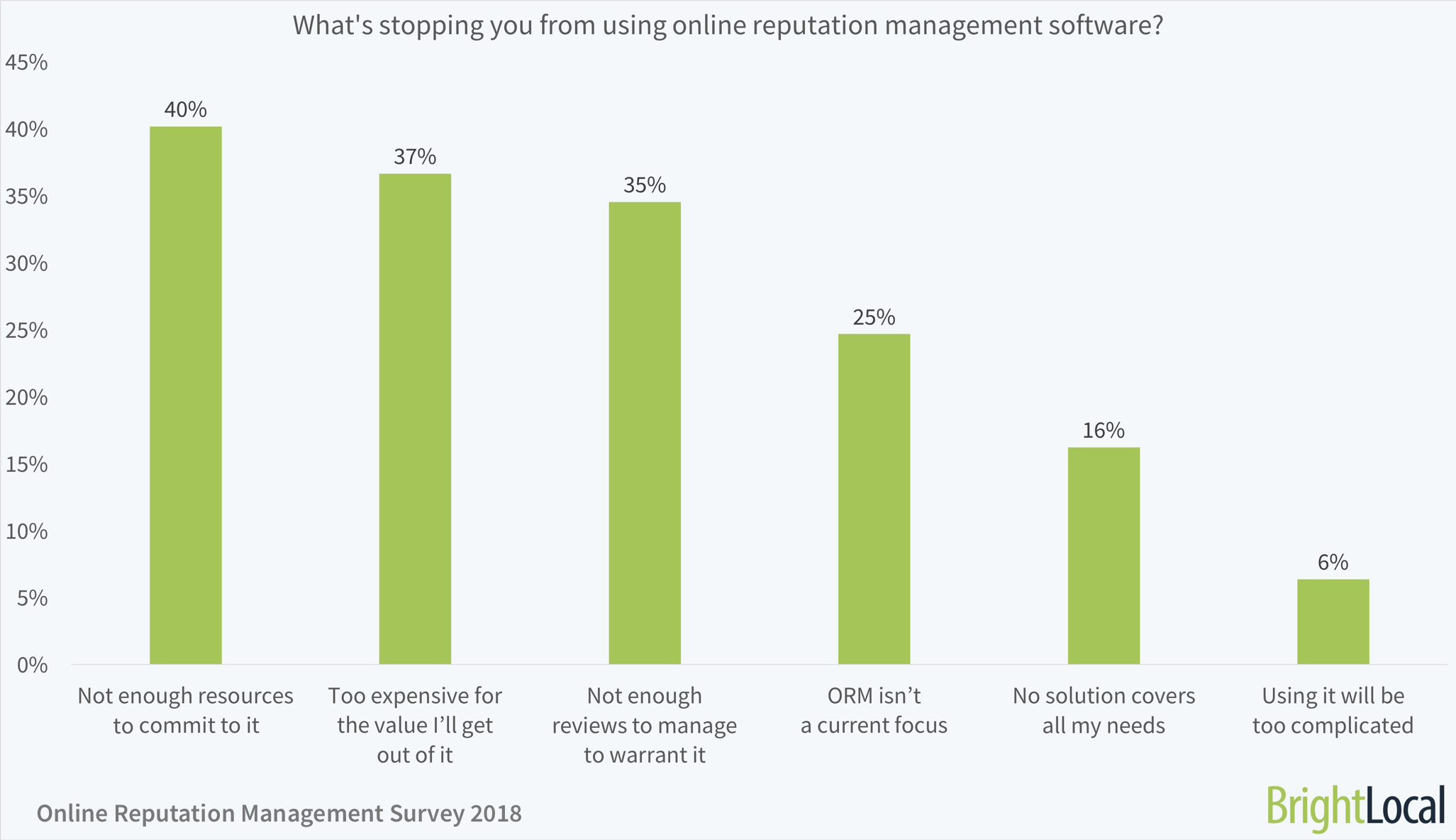
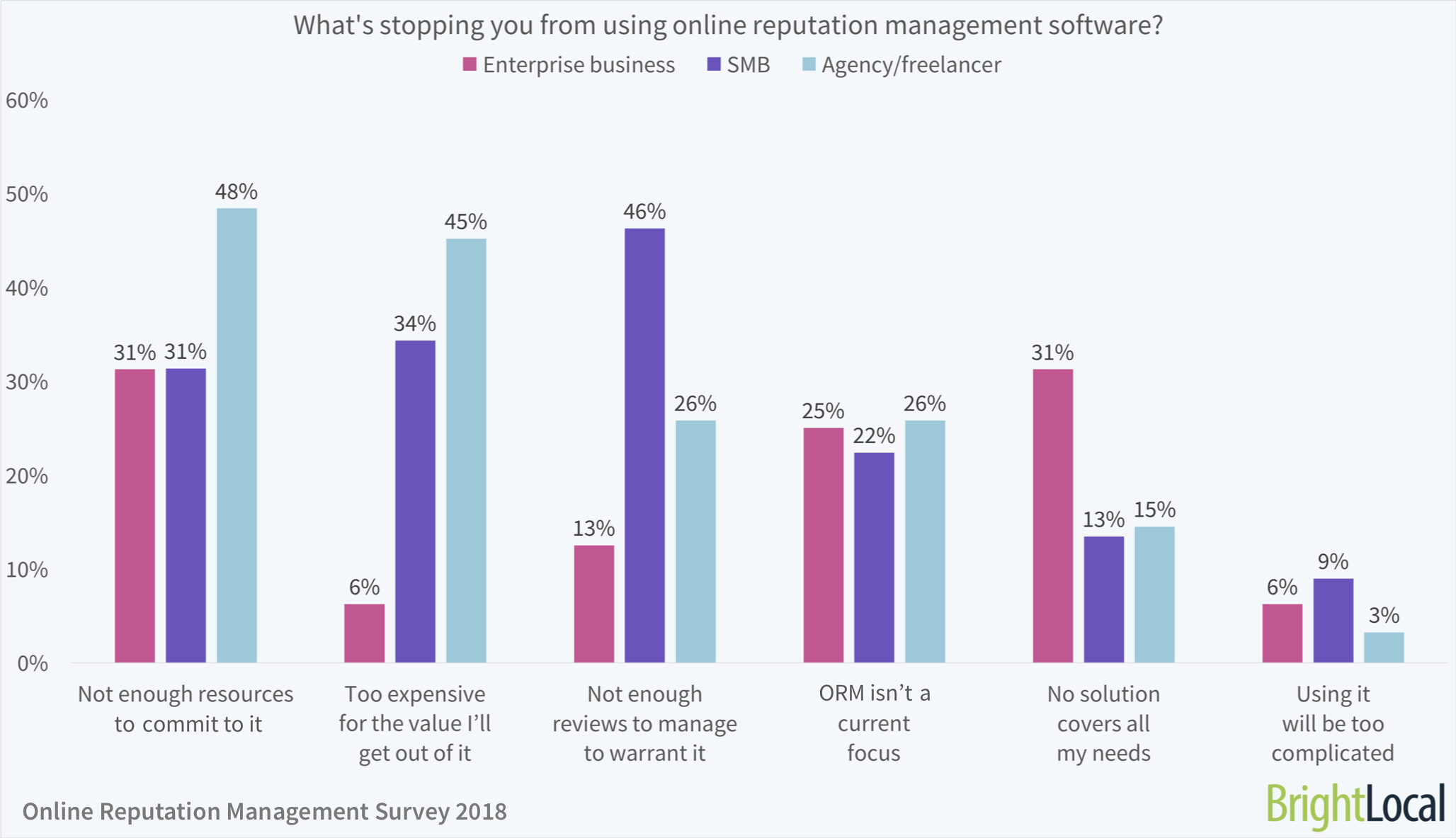
This question was only answered by the respondents who do not currently use online reputation management software. Respondents could answer up to three options.
Key Findings
- The biggest reason respondents aren’t using online reputation management is a lack of resources
- 37% were discouraged by the ROI for ORM
- 48% of agencies and freelancers are put off by their resourcing level
Time and money are, unsurprisingly, the biggest reasons stopping respondents from using an online reputation management solution.
We were surprised at the high number of agency and freelance marketers who were deterred by the time and cost involved. With consumers (and search engines!) increasingly focusing on reviews, are marketers being held back from adding a new string to their bow due to a perceived large upfront investment of time and energy?
There’s a lot of potential for upselling reputation services to local clients as part of existing marketing packages, so, marketers, it’s definitely worth reviewing your offering to see if expanding your services could bring in extra revenue.
What are the best practices to follow for successful online reputation management?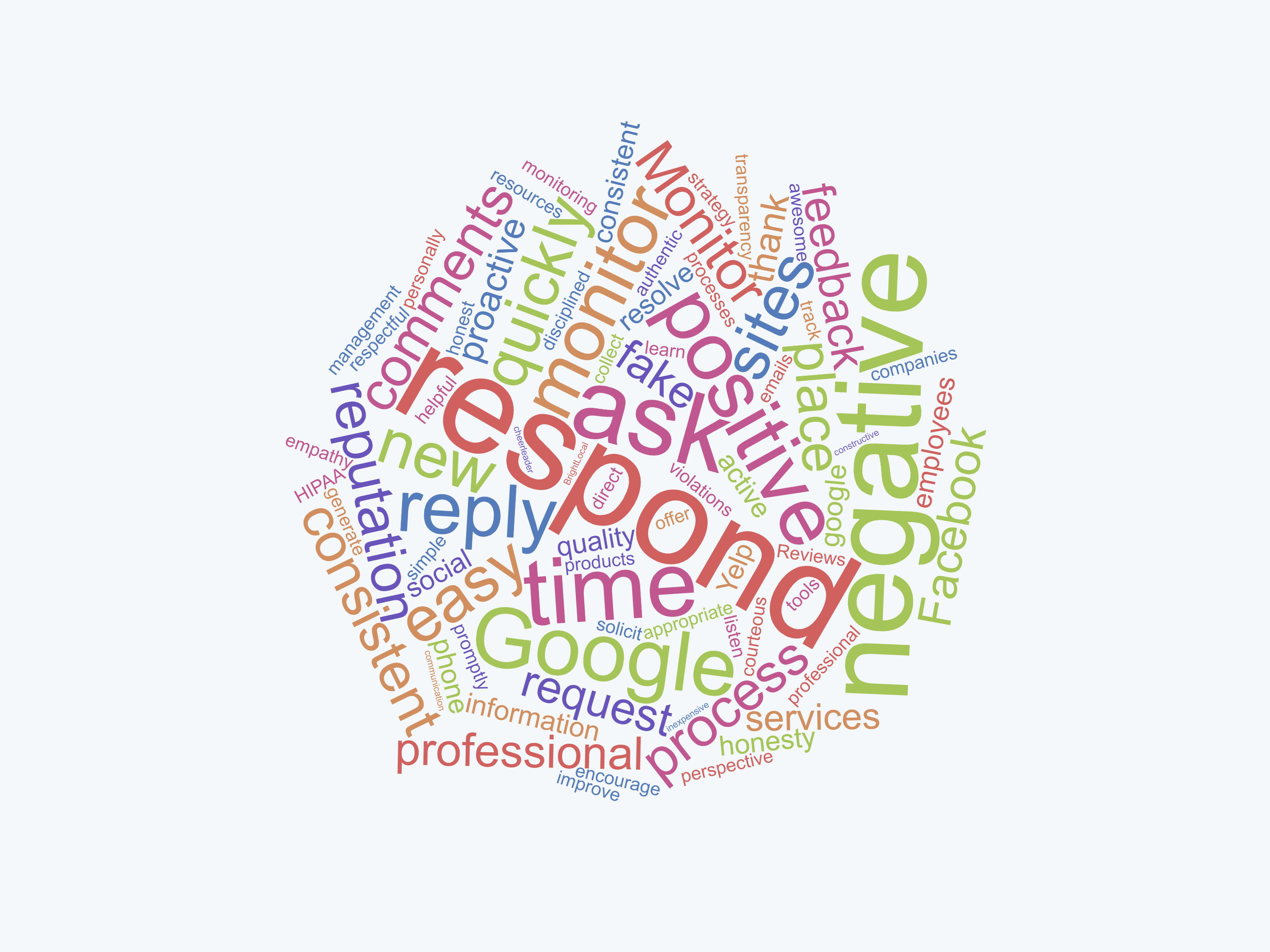
We asked respondents to share their tips for successfully managing their online reputation. Below are some of our favorite responses.
Your Reputation Tips
Be Nice
- “First of all, have a good work ethic. Bad business will be reflected as such and there’s no remedy for that.”
- “Having great service and an incredible product should be your number one priority, without that, quit and start over.”
- “Put empathy and kindness at the forefront of everything you do, and the rest will fall in place.”
- “Keep an eye on what shows up when you Google your brand name. Prioritize review sites that show star schema and show up for branded search.”
Ask For Reviews
- “The best time to ask for a review is when a customer is in your place of business and they are waiting for you to complete a task (while filling out paperwork, etc.) because you are asking them to leave a review on your time, not on theirs.”
- “Have a solid strategy to identify and reach out to your “cheerleader” customers who are most likely to give a positive review and are already active online. Make the process simple, and easy to complete in less than a minute.”
- “It’s a long game – if you’re not playing it now, you’re already behind. But! not many other businesses have mastered it, you can start now, do it right, and slowly take advantage. Don’t try any schemes or tricks, if it hasn’t been pegged as spam yet – it will be. The way to success is to make reviews part of your process, tell your team, and make sure every client gets asked to leave a review.”
- “Stay proactive on getting good reviews so when you do get a bad one it won’t stand out.”
Train Your Team
- “Make your manager or employees’ bonus structures built around getting more reviews. If the employees know you are serious about them getting more authentic reviews and you give them additional training, review request handouts and posters, review requests emails and texts, your new reviews will greatly increase.”
- “Have processes in place to develop an appropriate response whether it is flagging the review based on TOS violations, or responding appropriately to both negative and positive reviews. Following up with phone calls or emails especially on negative reviews in an attempt to win back the customer.”
- “Someone at the local business needs to monitor and reply to reviews and be educated on how to reply (learning about HIPAA violations, appropriate responses to negative reviews, and implementing keywords naturally and sparingly).”
Respond!
- “Respond to all reviews, negative and positive. Your customer took the time out of their day to write a review for your company, you should be willing to do that same. It also shows prospective customers that you appreciate your customers’ time.”
- “When you receive a negative review don’t respond from an emotional place. Take a break and form a response that acknowledges their issue in a professional manner. How you respond to a negative review makes a big impression on potential customers!”
- “Always reply, especially paying attention to negative reviews so the author understands they are acknowledged and the company cares, and so consumers can have insight into two perspectives.”
- “Respond to reviews in a timely fashion. If there’s a negative review, respond once and then offer to talk privately so the situation doesn’t become derailed. Make sure fake reviews get removed so they don’t hang around and damage your reputation.”
Thank you for reading the findings of our Online Reputation Management Survey! What’s your strategy for managing your local business reputation? Let us know in the comments below!

